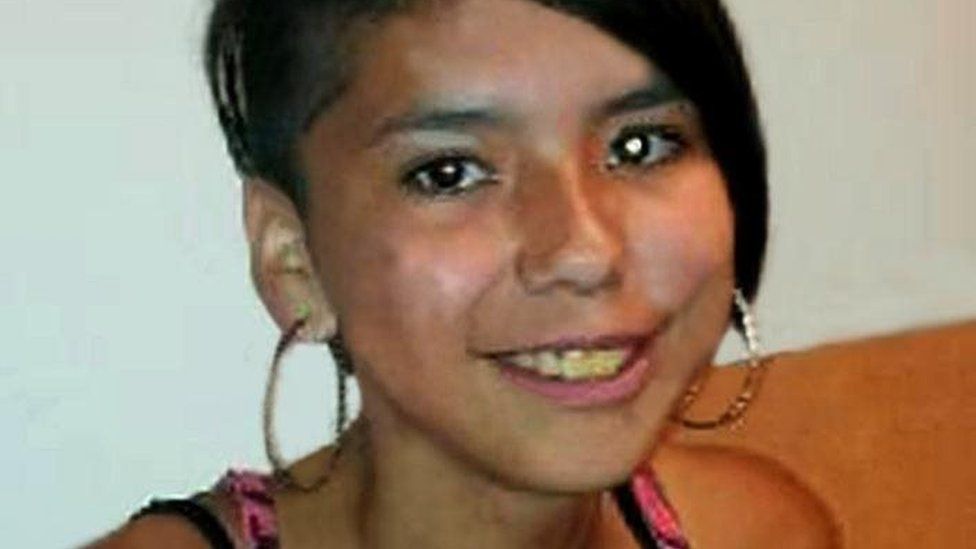Tina Fontaine: Raymond Cormier not guilty of Red River murder
- Published

A Canadian man has been found not guilty in the death of indigenous schoolgirl Tina Fontaine.
Raymond Cormier, 56, was charged with second-degree murder in the death of the 15-year-old in 2015.
Ms Fontaine's body was pulled from Winnipeg's Red River on 17 August 2014, a week after she was reported missing.
Her death renewed calls from activists to launch an inquiry into missing and murdered indigenous women and girls in Canada.
On Thursday, the 11-person jury found Mr Cormier not guilty, after some two days of deliberations.
Moments after the verdict was read, the hashtag #justicefortinafontaine began to trend online.
Allow Twitter content?
This article contains content provided by Twitter. We ask for your permission before anything is loaded, as they may be using cookies and other technologies. You may want to read Twitter’s cookie policy, external and privacy policy, external before accepting. To view this content choose ‘accept and continue’.
A forensic pathologist testified during the trial that it was not possible to determine how Ms Fontaine died.
No DNA linked Mr Cormier to the murder.
He was arrested in December 2015 following a lengthy undercover sting operation by police.
The Crown's case relied heavily on audio recorded by police of Mr Cormier during that operation. Various witnesses testified that Ms Fontaine and Mr Cormier were acquaintances.
She was raised by her great aunt, Thelma Favel, on the Sagkeeng First Nation, north-east of Winnipeg. She left her home to visit her biological mother in the provincial capital following her father's death.
Police have described Ms Fontaine as "highly vulnerable" and said she was exploited during her time on the run. She was in the care of the child-welfare system in Winnipeg, Manitoba, when she disappeared.
Her body was found weighed down and wrapped in a duvet cover, and she was identified in part by the angel wings tattooed on her back.
The discovery of her body sent shockwaves through the city.
Hundreds took to the streets and social media to demand better protection for indigenous women and girls.
The murder also shone a spotlight on ways the system failed the teenager. On the last day she was seen alive, she interacted with police, hospital staff and child welfare workers.
Federal politicians, including Indigenous Services Minister Jane Philpott, offered sympathy to Ms Fontaine's family in the wake of the verdict and vowed to work to reform the child welfare and the justice system.
Allow Twitter content?
This article contains content provided by Twitter. We ask for your permission before anything is loaded, as they may be using cookies and other technologies. You may want to read Twitter’s cookie policy, external and privacy policy, external before accepting. To view this content choose ‘accept and continue’.
Crown-Indigenous Relations Minister Carolyn Bennett said on Twitter that Ms Fontaine's story "demonstrates the failures of all the systems for Indigenous children and youth on every level. We need to do better - we need to fix this".
Indigenous leaders in Manitoba expressed "extreme disappointment" in Thursday's verdict.
Canada launched a multi-million dollar inquiry into missing and murdered indigenous women and girls in 2016, though it has been beset by delays and resignations.
Special Report: On the trail of the murdered and missing
BBC reporter Joanna Jolly went on the trail of the murdered and missing to find out why so many of Winnipeg's Aboriginal women and girls have been killed.
This is an immersive story told through text, images and video, best viewed on an up-to-date browser.
- Published11 December 2015
- Published12 February 2018
- Published13 February 2018
